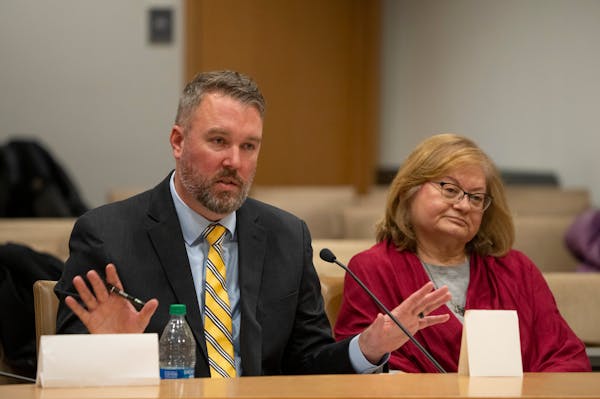FBI agents arrested a man connected to the sprawling federal investigation of a child nutrition program Wednesday, taking him into custody as he attempted to board a flight to Amsterdam at Minneapolis-St. Paul International Airport.
Federal prosecutors charged Isanti resident Mohamed Jama Ismail, 49, with knowingly making a false statement when he applied for a new passport in March after authorities seized his passport during a January raid of his house. Ismail falsely claimed that he lost his passport at home, according to a criminal complaint unsealed Thursday afternoon. Ismail used the new passport when he checked in for his flight, the complaint said.
"His motive was not fleeing the country," said St. Paul attorney Patrick Cotter, who is representing Ismail. "His motive was simply to go see his family. That's why he had a return flight."
Ismail's wife and five children live in Kenya, which is where Ismail was scheduled to fly after a layover in Amsterdam, according to the charges. Cotter said Ismail's father also lives in Kenya.
As one of the owners of Empire Cuisine & Market in Shakopee, Ismail and his partners collected at least $24 million as one of the main food providers for two nonprofit sponsors, Feeding Our Future and Partners in Nutrition, according to search warrants unsealed by federal authorities in January. According to the warrants, the FBI maintains that $11.1 million of the $24 million received by Empire or its affiliates was misappropriated.
Ismail personally received $2.2 million in program funds, according to the criminal complaint filed this week. Ismail told investigators that he owns 20% of Empire, the charges say.
The FBI alleges that Ismail and his business partner used millions of dollars in program money to buy homes and other real estate, including a $575,000 single-family home in Savage, two lakefront lots in Prior Lake, a $1.5 million home in Prior Lake and $1 million commercial property in Louisville, Ky.
Investigators said they seized $6 million from bank accounts controlled by Ismail, his business partner and their companies.
Cotter declined to address Ismail's involvement in the meals investigation.
"I am not going to comment on that," he said. "We will address that in court, where it belongs."
According to the criminal complaint:
The U.S. Attorney's Office told Ismail's attorney Feb. 1 that Ismail was the target of a federal investigation and would likely be indicted. Less than two weeks earlier, the government had raided the offices of Empire, Feeding Our Future and other organizations accused of defrauding the food aid program in Minnesota. Partners In Nutrition has not been identified as a target of the investigation.
Ismail told investigators that his wife and children moved to Kenya in 2018 and that he owns three pieces of real estate there. He told agents that his wife splits her time between Kenya and the United States. The government said that is not true because she has not returned to the United States since 2018.
Agents seized Ismail's passport while searching his home in January. Two months later, Ismail applied for a new passport, claiming he needed a new one because he had lost his old passport, according to the complaint. He also claimed to have filed a police report involving the loss of his passport, which federal investigators said is also not true.
It is a crime to make a false statement when applying for a passport.
Ismail received his new passport March 22 and soon booked an April 20 trip from Rochester, Minn., to Kenya. He was scheduled to fly through the Twin Cities and Amsterdam.
FBI agents arrested Ismail on the jetway at Minneapolis-St. Paul International Airport about 2:30 p.m. Wednesday as he was boarding the Amsterdam flight. According to the complaint, he had checked five suitcases and was pulling a carry-on suitcase at the time of his arrest. He made an initial appearance in federal court Thursday and remained in the Sherburne County jail Thursday evening.
Empire's main business is a small restaurant and adjoining grocery in downtown Shakopee.
Ismail and Abdiaziz Farah started the company in April 2020, shortly after the pandemic forced Minnesota Gov. Tim Walz to declare a state of emergency. The company quickly created a network of other providers that claimed to be serving more than 160,000 meals a day at 25 sites in Minnesota, according to the FBI.
The IRS had filed a tax lien against the owners' affiliated gas station in 2018 for $89,516 that was released in August 2021. The grocery store faced financial problems of its own last year: The state levied a $3,419 tax lien against the business in June 2021 that was released two months later, and American Express won a $15,846 court judgment against the grocery and Farah's co-owner in July that was settled after a month.
The FBI says in search warrants that one of Empire's busiest sites was supposed to have operated at 1506 Southcross Drive in Burnsville, where the company claimed more than 50,000 meals were served in November 2021. A federal agent surveilled the site the day before Thanksgiving and saw "no activity." The agent also found no evidence of meals being served several days in December.
Through her attorney, Feeding Our Future director Aimee Bock said she hasn't reimbursed Empire for meals since June 2021. "Ms. Bock visited the site and was very upset about the quality of the food," attorney Kenneth Udoibok said earlier this year.
While Ismail is not charged with fraud related to the federal nutrition programs in the complaint unsealed Thursday, it's not uncommon for authorities to arrest and charge an individual with a lesser crime before adding additional charges, said Jeff Van Nest, who retired this year from the FBI and teaches legal writing at the University of Minnesota Law School.
The FBI unsealed more than 200 pages of search warrants Jan. 20, revealing publicly that the agency had started an investigation last May into a "large-scale scheme" to defraud the government. Investigators allege more than a dozen people used tens of millions of dollars meant to reimburse them for providing meals to children in need; instead, the money went to buy lakefront homes, luxury cars and for other personal uses.
Three months later, no related charges have been filed despite the FBI searching for evidence related to mail fraud, wire fraud and money laundering.
Van Nest, who also works for the Center of the American Experiment, couldn't comment about this specific case but he said that, generally, FBI agents will unseal cases when it's clear no evidence will be destroyed or the case negatively affected. Once information is released, it could help investigators gather tips from the public. But it can vary how long it takes to sift through evidence gathered from search warrants before authorities file charges — if any charges are brought, Van Nest said.
"The FBI has really one shot to get it right," he said. "No one wants to see anybody rush through a case. … The public expects that charging decisions are going to be made when all of the evidence is in, all of the investigative leads have been run to ground and there's no stone left unturned."
Staff writers Kelly Smith and Stephen Montemayor contributed to this report.
New Minnesota GOP leaders seek peace with party's anti-establishment wing

Who is Republican Lisa Demuth, Minnesota's first House speaker of color?

Minnesota House GOP, Secretary of State Steve Simon return to Supreme Court
Supreme Court sides with DFL and Simon, says 68 House members needed for floor action

